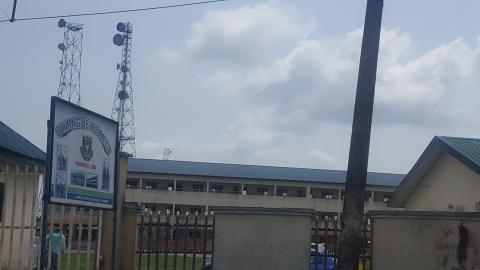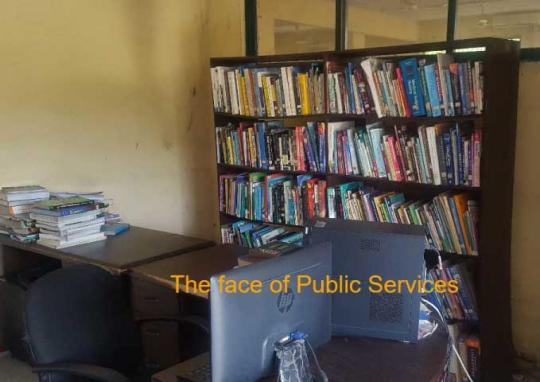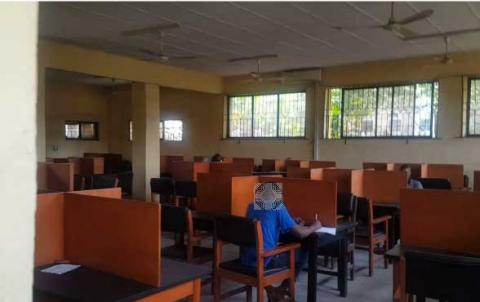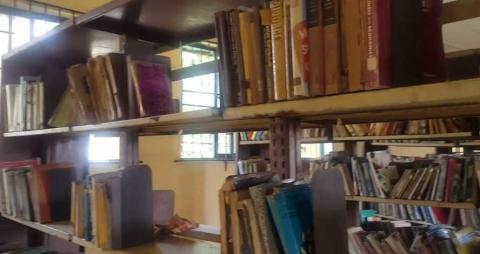Libraries - epitome of a thriving City
Warri City Library
The journey by road to Warri lent itself some ridiculous moments. I was travelling with my niece returning to University in delta state. The hired taxi that initially offered its service to us was frightfully out of order that I quickly overcame my hesitation about declining its offer. The vehicle was not road worthy in any sense. Its interior was like a scene from a local car mechanic garage. He interestingly installed a digital display besides the steering. The contraption was like the remnants of a car crash, refitted to continue its journey. A quick look at the exterior to take stock of the risks prompted me to ask the driver what was his assurance the vehicle would make it to Warri. His reply was not in any way reassuring. He told me it’s all in God’s hand or something to that effect! Now I imagine he expected me to join him in faith to board this ridiculous vehicle taking his word without any evidence of an effort to have done all humanly possible before committing the unknown to God. That vehicles’ risk assessment would be so riddled with probabilities that each journey on it would be with bated breath. I declined the offer and told the driver who brought us to the garage (motor park) to get us out of there ASAP. As we were heading off, the same car hire driver ran up to us and flagged us to stop. He informed us they had another vehicle that could take us which was in better shape. This was welcomed news. The vehicle was much better in appearance and sound. We began our nearly hour long trip which went smoothly with minimal anxieties regarding vehicle road worthiness.
This experience surmises the state of Nigeria. A nation where its’ leaders take advantage of opportunities and cut corners to the detriment of its citizens. The culture is now so ingrained that it is expected that leaders by default would enrich themselves and also allow others do likewise.
The highlight of my trip to Warri was my visit to its public library. Some of our friends on Firstbaze May recall an earlier challenge to post pictures of their local public library. Well this was the motivation. Beyond that, I hold fond memories of my childhood experience of visiting this library. In my teenage years I also found it very useful in studying for examination; school certificate, JAMB and GCSEs. When I told my friends of my plan to visit the library they could not help looking shocked. They knew fully well what I would find. I was indeed also shocked to say the least.
Driving through Warri was made easy by a friend who left me the use of his car. The picture of Warri is probably a reflection of the chaos that rules in Nigeria. Sadly the state governor believes he deserves to run for elected office a second term. Many certainly disagree with this premise but I see billboards plastered all over town with various party figures running for office alongside the so called governor.
The road leading into the city is itself in disarray. It remains unclear what the government had in mind. There were heavy blocks laid in the middle of the road since the previous governor held office. Getting into Enerhen Junction, we were held in traffic for over an hour only to discover the reason was due to road works in progress at the junction around the popular Jim’s travel agency. There were, of course no warning or diversion signs. This pattern is reminiscent of traffic along the main atrium into the city – Warri-Sapele road.
On my last day in Warri, I could not resist the urge to visit the public library. There are security fears in this town; robbery, kidnapping, petty crimes etc. Yet what strikes you is the enterprise displayed by persons and groups. This is a city that has being involved in trade for over centuries following the arrival of Portuguese and later, the British. I will return to this theme later. Come oil boom, the city is now left in utter confusion. Warri was and became the hub for oil exploration, production and distribution. Unfortunately this state of affairs took a nose dive for multiple reasons. The city is now battling with unemployment, insecurity and poverty. The roads and the houses reflect this depredation.
I drove through from airport road, through “Estate Junction”, into Okere road, past Esisi Junction, the Nigerian Prison; still looking unwelcoming and drab with piles of wood gathered around the front “High College” walls. I continued towards mission road. Okere road is now dualized. And I am sure this would have required a lot of negotiation to achieve knowing how for years this road was a nightmare to traverse especially during the rains. Turning into Mission road was nostalgic. I was a pupil of the primary school to the right, formerly NBC school 1 or 2 depending on what stream one attended. It was later renamed Doghor primary school. I also grew up attending the Baptist church whose presence on this prime parts of Warri gave the road its name.

The schools to my left were also significant in my experience. These were mission schools of the Anglican faith also later renamed Mowoe and Okugbe primary schools when taken over by the State. A secondary school Uwangue College took over a part of the school grounds in the in late 80s if I recall. My childhood memory of these grounds was the annual funfair that held there in the early to mid-70s. A combination of agricultural shows and technological displays. A lot went on to shape the economy of the town in those times.
I continued down Mission road towards what are now the local council grounds off Swamp road. This for those familiar with Warri is the so-called GRA.
The Public library moved to its current location, few yards away from the nearby school grounds, after its first major development over 40years ago. It was not much different from the last time I was here, studying for school certificates and JAMB exams. Its outer fencing of metal and block work told me no maintenance work had taken place for a while. The building was not different from the state of the city but for its newish long span roofing. Neglect, was written all over it. I was even more curious. I walked in through the wide gate approaching the block from its left flank. There was a wide doorway inviting me into what I imagined was the library main entrance. It looked busy. I was wrong. It seemed this section was rented out to a private business – some form of bookshop. A gentleman sat behind a wide semi-leathered top desk. He looked busy. A woman sat across to the left on a separate table. She locked eyes with me. There were bookshelves behind her. The office space looked tired. I enquired, “Good morning ma’am, is this the library?” She looked at me sympathetically, guessing I was a visitor. “No”. Pointing to her left, she indicated it was next door. I thanked her and after acknowledging the three others, turned and went the direction advised.

Another wide doorway welcomed me into the reception lobby of the public library. There were two groups of desks, both facing the door way. The first group to my right was set slightly more forward and comprised two tables with a third curved table piece in between, creating an L-shaped work surface. There was a desktop PC proudly stating its significance as the only claim to modernity. I observed a respectfully looking swivel arm chair behind these desks. It was at this point empty. The second group of desk was to my left and positioned a bit behind the first, this was occupied by a gentleman who took in my presence somewhat suspiciously. I was about to explain my visit when a lady walked to the doorway, probably wondering the reason for my presence. I had observed her earlier walking towards a car parked by the outer wall of the fence. She obviously returned not to miss anything or be caught out if not at her post. I explained to Mr Okolo the purpose of my visit. By being friendly and positive in my approach he eased up. I told him I grew up in the town, attended primary school nearby and enjoyed visiting the library during my childhood long before they moved to the current site. I reflected how little appears to have changed in terms of its layout. Apart from the reading desks and the near empty shelves, there was clearly nothing to say this would be anything close to being called a modern Public library. There were two desktop computers which were relic from an era when things might have been different. Mr Okolo told me he was an assistant. His boss was around and would probably be back shortly. He goes on to offload what the state of affairs has being. There was nothing you could call an archive. They fought hard to sustain supplies of some newspapers for some years but gave up. He knew they ought to have a catalogue system but that was certainly not going to happen. The government was only barely paying their salaries which they have to be grateful for. He lamented on the neglect of the role of the library in a big city as Warri. But everyone had come to accept change was not going happen. I explained to Mr Okolo my interest and how as part of our objectives I was keen to highlight the state of public services to all who think differently about leadership in our communities. Sadly it was obvious the current crop of politicians were all about looting and destroying the fabric of society.
I understood it may be expected that I sought permission from managers to make a video recording of what was before me. However I only had to ask. He was certainly very glad for me to do all I felt was needed to turn the tide around where possible. I explained this was for a public awareness campaign with a view to instigating change and if possible regeneration.

To the right of the reception lobby was a reading room with wooden tables partitioned to allow privacy for readers. I observed some persons reading at the desks. Not more than four this side. I made a brief video recording avoiding any direct shots of the readers.
Returning to the lobby, I walked across to the left wing of the library. It was slightly smaller but with more bookshelves; six or seven, this time with “books”. The bookshelves were in solitude bemoaning there now abandoned status. There were two smaller older wooden cataloguing shelves; one seemed clean compared to the other which was coated with dust, just like the book shelves. This wing also had a few persons reading. What was also noticeable was that apart from the female staff there was no other female in the reading rooms. This was not surprising. A young female in these parts of town would be vulnerable. The state of the library itself offered no sense of security.

I began recording a clip of what was before me. As I turned to leave, a young man, took interest in my activities and told me how pleased he was to see someone doing this. I went over to his desk and introduced myself as simply as I could. He introduced himself and went on to tell me why he still used the library. Abraham, his name was, agreed to do a video clip of his experience of the library and services in the city.
Nearing the end of my visit, I returned to the reception to say thanks and goodbyes. I realised the librarian by this time had returned to his desk. It was a welcome opportunity to hear from the horse’s mouth how things were. Mr Henshaw was indeed pleased to have this opportunity to bare his mind on the situation without any naming or shaming per se.
The reality is that the state of public institutions is the litmus test of the worth of any government. From transport networks to public utilities; from health and nutrition to education and from employment to human capacity development; the heart of the matter is that leadership that holds the wellbeing of its citizens at its core transforms society in ways that restores hope, builds trust and empowers its followers. Nationhood becomes the pride of its citizens. And rather than the current drive to exit the country, there is a yearning to return to the motherland.
I was told that there had indeed being an effort by the government to renovate the library. As it were, the sum of fifty-eight million Naira was reportedly spent on a regeneration project that involved raising the height of the building and repairing the fence. Whilst it may indeed be the case some government agency may have granted a contract for such works, they clearly have not addressed the essence and purpose of a local public library. The evidence spoke for itself. That sum was definitely not spent on the library I visited as it were.
I ended my visit saddened by the fact that the state of education continues to slide into an abyss with little prospects of salvation. My memories of childhood pleasures and access to resources from far flung lands – comics, picture books, ladybird novels and texts etc. was but now only a dream. Today’s generation of children from under-privileged background are unlikely to ever experience the freedom that self-directed learning brings. The confidence it bestows from knowledge gained of the world around them.
My resolve was, if anything to spread the word, peradventure one could step in to save this situation. Where there is a will there might just be a way around this.
* Names have been anonymized to protect individual rights.
